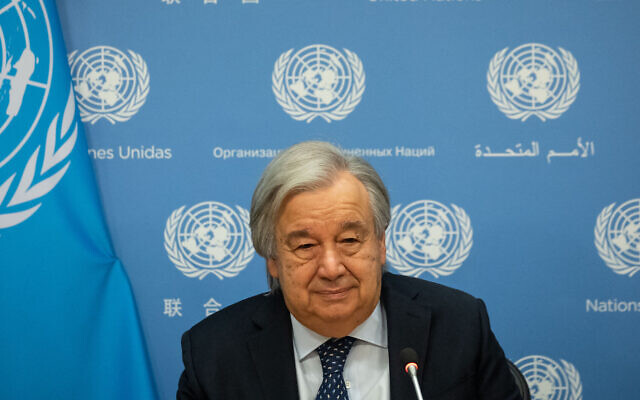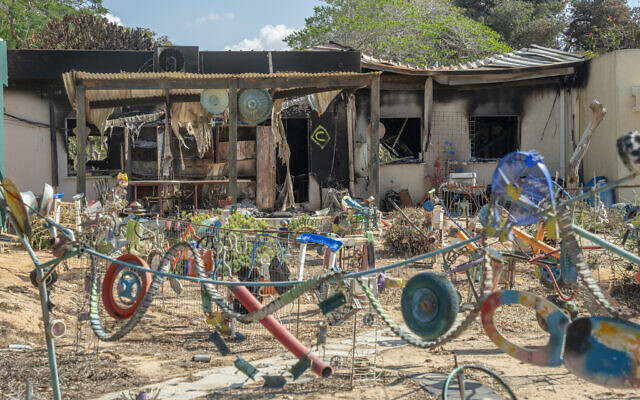



Many traumatized Israelis have compared the bloody Hamas onslaught of October 7 to the horrors of the Holocaust, but the head of the national memorial to the genocide disagrees.
Dani Dayan, chairman of Jerusalem’s Yad Vashem memorial center, stressed that the attack, although appalling, was fundamentally different from Nazi Germany’s mass murder of six million Jews.
“I do not accept the simplistic comparison with the Holocaust even if there are similarities in the genocidal intentions, sadism, and barbarism of Hamas,” Dayan told AFP.
“The crimes that took place on October 7 are on the same level as Nazi crimes, but they are not the Shoah,” said the former Israeli diplomat, using the Hebrew term for the Holocaust.
Dayan said he understood the revulsion and dark echoes triggered by the Hamas massacre, when some 3,000 terrorists broke through the Gaza border and rampaged through southern communities, killing at least 1,200 people, mostly civilians, and abducting over 240. Israel responded with a massive air and ground campaign aimed at eliminating Hamas.
“For any Jew who has heard the stories of families putting their hands over a baby’s mouth to stop it from crying, the association of ideas is obvious. We have all thought about it,” he said.
Aside from the different scale of the events, Dayan pointed to the fact that Jews today — unlike those during World War II — are far from defenseless victims, and that the State of Israel has hit back hard.
“We cannot compare it with the period of the Holocaust because there is an army here which is fighting and making Hamas pay the price,” he said.
The Hamas-run Gaza health ministry claims that over 14,000 people have been killed in Gaza since the start of the war on October 7. The figures provided by the terror group cannot be independently verified and do not differentiate between civilians and Hamas gunmen, or distinguish between those killed by Israeli airstrikes and those killed by hundreds of failed Palestinian rocket launches.
A temporary respite was in sight Thursday as Israel and Hamas have agreed a truce of at least four days and an exchange of some Israeli hostages and Palestinian prisoners, although Israel has maintained it will continue its war effort within days.
Prime Minister Benjamin Netanyahu and others have repeatedly called Hamas’s devastating onslaught the worst against Jews since the Holocaust — but Dayan warns against such parallels.
Early on, Israel’s Ambassador to the United Nations Gilad Erdan pinned a yellow star to his chest, insisting he would wear it “with pride” as long as the Security Council did not condemn the Hamas “atrocities.”
“Some of you have learned nothing in the past 80 years,” Erdan said.
Dayan at the time wrote in a Hebrew-language post on social media platform X, formerly Twitter, that “this act disgraces the victims of the Holocaust as well as the State of Israel.”
“The yellow star symbolizes the helplessness of the Jewish people and their being at the mercy of others,” he said. “Today we will fasten to our lapel a blue and white flag, not a yellow star.”
Dayan said he was even more irritated by comments from UN Secretary-General Antonio Guterres, who said Hamas’s massacre “did not happen in a vacuum,” referring to the Palestinians’ plight under decades of Israeli rule.
“I asked him what context could explain the beheading of children, rapes, or shootings of young people at a music festival,” Dayan said.
Yad Vashem, the World Holocaust Remembrance Center, was established in 1953, five years after the creation of Israel.
Since October 7, it has canceled educational seminars and turned some spaces into classrooms for hundreds of students evacuated from southern Israel.
It was necessary, said Dayan, to “adapt the premises” to the needs of the children displaced by the attacks or evacuated amid the Gaza war.
“We removed the photos from the walls so as not to add trauma to trauma,” he said.
The memorial center itself counts some of its own staff among the victims.
Polish-born Israeli historian Alex Dancyg, 75, who worked at Yad Vashem, was last seen at Kibbutz Nir Oz and is feared to be among the hostages, as is one of the museum’s guides, Liat Atzili.
A fellow educator, Shlomo Balsam, also rejected likening October 7 to the Shoah, even as he said “I hear survivors say that it takes them back to that time.”
Balsam is the honorary president of Aloumim, an Israeli organization for Holocaust survivors who were hiding in France during the war.
Some of those survivors met at Yad Vashem recently and discussed both their childhood memories and their fears for the hostages, and for grandchildren serving as soldiers in Gaza.
“Children held hostage alone in Gaza are like us when we were abandoned alone during the war,” said one octogenarian, Meira Bursztejn-Barer.
Berthe Badehi, 91, who survived World War II hiding in a farmer’s house, said the fear she felt at the time had returned.
This time around, she said determinedly, “we will emerge victorious.”
Times of Israel staff contributed to this report.



